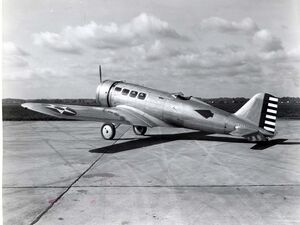Engineering:Northrop C-19 Alpha
| YC-19 Alpha | |
|---|---|

| |
| Northrop Y1C-19 | |
| Role | Transport |
| Manufacturer | Northrop |
| Designer | John K. Northrop |
| First flight | 1930 (Northrop Alpha) |
| Introduction | 1931 |
| Primary user | US Army Air Corps |
| Number built | 3[1] |
| Developed from | Northrop Alpha |
The Northrop C-19 Alpha was a series of three aircraft purchased from Northrop by the US Army Air Corps in 1931. They were slightly modified versions of the civil Northrop Alpha Type 2.[1]
Design and development
The YC-19 aircraft were Northrop Alpha 4s supplied for evaluation to the USAAC. No production orders were given.[1] The major difference between the C-19s and the Alphas was that the civilian version carried a pilot and six passengers while the Army version carried a pilot and four passengers.
Operational history
One aircraft, the last of the three purchased, crashed between Richmond and Petersburg, Virginia on Sunday, March 19, 1933, killing its pilot and two passengers.[citation needed] The other aircraft were used for several more years until being sent to training schools as subjects for maintenance and repair classes.
Variants
- YC-19
- one aircraft, previously an Alpha 4, serial number 31-516[2]
- Y1C-19
- two aircraft, serial numbers 31-517 to 31-518,[2] Pratt & Whitney R-1340-11 engine[3]
Operators
 United States: US Army Air Corps
United States: US Army Air Corps
Specifications (Alpha landplane)
Data from Janes all the Worlds Aircraft 1931[4]
General characteristics
- Crew: 1
- Capacity: 6 passengers
- Length: 28 ft 4.5 in (8.649 m)
- Wingspan: 41 ft 10 in (12.75 m)
- Height: 9 ft 0 in (2.74 m)
- Wing area: 295 sq ft (27.4 m2)
- Airfoil: Clark Y[5]
- Empty weight: 2,660 lb (1,207 kg)
- 2,900 lb (1,315 kg) Seaplane
- Gross weight: 4,500 lb (2,041 kg)
- 4,700 lb (2,132 kg) Seaplane
- Powerplant: 1 × Pratt & Whitney R-1340 Wasp 9-cylinder air-cooled radial piston engine, 420 hp (310 kW)
- Propellers: 2-bladed fixed-pitch propeller
Performance
- Maximum speed: 170 mph (270 km/h, 150 kn)
- 165 mph (143 kn; 266 km/h) Seaplane
- Cruise speed: 145 mph (233 km/h, 126 kn)
- 140 mph (122 kn; 225 km/h) Seaplane
- Stall speed: 60 mph (97 km/h, 52 kn)
- Range: 650 mi (1,050 km, 560 nmi)
- Service ceiling: 19,300 ft (5,900 m)
- 18,000 ft (5,486 m) Seaplane
- Absolute ceiling: 21,100 ft (6,431 m)
- 20,000 ft (6,096 m) Seaplane
- Rate of climb: 1,400 ft/min (7.1 m/s) at sea level
- 650 ft/min (198 m/min) at 10,000 ft (3,048 m)
- 1,250 mph (1,086 kn; 2,012 km/h) Seaplane at sea level
- 550 ft/min (168 m/min) Seaplane at 10,000 ft (3,048 m)
- 650 ft/min (198 m/min) at 10,000 ft (3,048 m)
- Wing loading: 15.25 lb/sq ft (74.5 kg/m2)
- 15.9 lb/sq ft (78 kg/m2) Seaplane
- Power/mass: 0.0935 hp/lb (0.1537 kW/kg)
- 0.0893 hp/lb (0.1468 kW/kg) Seaplane
See also
Related development
Related lists
- List of military aircraft of the United States
References
- ↑ 1.0 1.1 1.2 "The Complete Encyclopedia of World Aircraft" Editors: Paul Eden & Soph Moeng, (Amber Books Ltd. Bradley's Close, 74-77 White Lion Street, London, NI 9PF, 2002, ISBN 0-7607-3432-1), 1152 pp.
- ↑ 2.0 2.1 "United States Military Aircraft Since 1909" by F. G. Swanborough & Peter M. Bowers (Putnam New York, ISBN 0-85177-816-X) 1964, 596 pp.
- ↑ "U.S. Army Aircraft 1908-1946" by James C. Fahey, 1946, 64pp.
- ↑ Grey, C.G., ed (1931). Jane's All the World's Aircraft 1931. London: Sampson Low, Marston & company, ltd. p. 303c.
- ↑ Lednicer, David. "The Incomplete Guide to Airfoil Usage". https://m-selig.ae.illinois.edu/ads/aircraft.html.
 |
